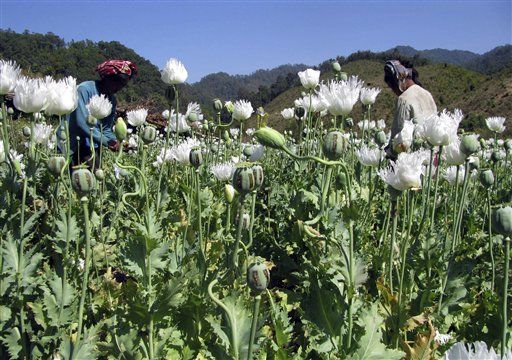Opium production in Burma increased 26 percent in 2013 to an estimated 870 tonnes, the highest since assessments by the United Nations Office on Drugs and Crime (UNODC) began cooperating with the Burmese government in 2002.
According to a UNODC report released on Wednesday, the 26 percent increase is linked to an expansion of areas in northern Burma under cultivation – from an estimated 51,000 hectares (510 sq.km) in 2012 to 57,800 hectares this year.
The report said that 92 percent of opium poppy cultivation in Burma takes place in Shan state, with the rest located mainly in Kachin state. Shan state is home to several armed groups who have been linked to the drugs trade for many years.
UNODC said that the Golden Triangle area encompassing the mountainous borders of Laos, Burma and Thailand accounts for 18 percent of global opium production, second only to Afghanistan.
“These figures make clear that we need to step up efforts to address the root causes of cultivation and promote alternatives to poppy growing,” said Jeremy Douglas, UNODC Regional Representative of Southeast Asia and the Pacific. “We need to act quickly. The Golden Triangle is the geographic centre of the Greater Mekong Sub-region, and plans are well underway to expand transport and infrastructure and lower trade barriers and border controls across the region. The organized criminal networks that benefit from Southeast Asia’s illicit drug trade are well positioned to take advantage of regional integration.”
[related]
The UN report said that the resurgence in cultivation and production may be fueled by a rise in demand for opiates in local and regional markets.
DVB reported on 3 December that an increasing number of young Burmese are becoming drug addicts, and that the drug of choice is known as “formula” – a cocktail of cough medicine and opium that is taken as a drink.
“Our survey shows a strong link between poverty and poppy cultivation,” said Jason Eligh, UNODC Myanmar Country Manager. “Opium farmers are not bad people, they are poor people. Money made from poppy cultivation is an essential part of family income. In poppy growing villages, significantly more households are in debt and food insecure than in non-poppy growing villages.
“Villagers threatened with food insecurity and poverty need sustainable economic alternatives or they will continue, out of desperation, to grow opium as a cash crop,” he added.
In October, Burmese police announced they had arrested a man with 133 kilos (293 pounds) of heroin worth US$2 million at local prices – the country’s biggest seizure of the drug this year.



